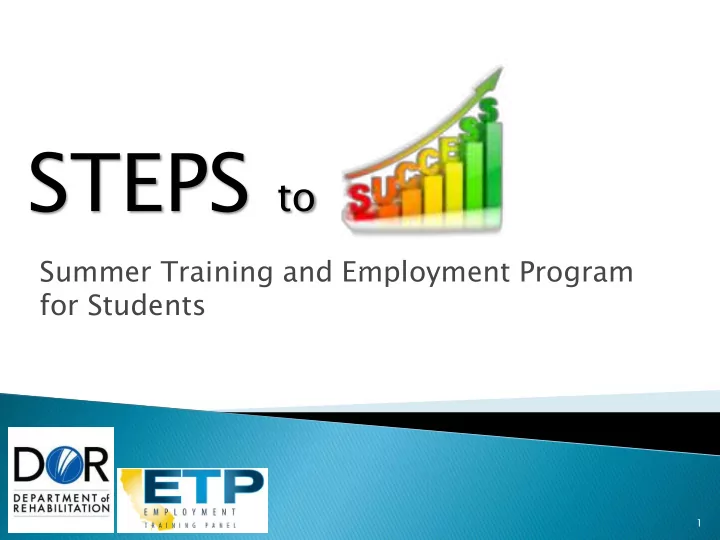

STEPS to Summer Training and Employment Program for Students 1
Stewart Knox, Executive Director, ETP ▪ Mark Erlichman, Assistant Deputy Director, DOR ▪ Michelle Alford-Williams, Manager, Business Services, DOR ▪ 2
S T E P S Innovative Partnerships to Serve Students with Disabilities 3
Create a partnership between The Employment Training Panel (ETP) and The California State Department of Rehabilitation (DOR) Provide federal funding to local Workforce Boards to support training and paid work experiences Utilize resources to forge closer working partnerships at the local level between Boards, AJCCs, DOR and LEAs 4
An interagency agreement between DOR and ETP Funds that ETP can distribute to local areas to serve in-school youth with disabilities Local Boards request funding through a competitive solicitation for proposals Awards support AJCCs working with partners to support training and paid work experience 5
Expect SFP to be released in January or early February Applications would be accepted for about 21 days Award decisions would be made within 30 days of final application deadline Expect awards to be provided to local areas for the current federal fiscal year (April – September 2018) Upon request, with an approval, funds could be carried over beyond September 6
$1.5 Million available Awards from $100,000- $250,000 Expectation: no more than $5000 per youth served $250,000 = 50 Student participants 7
Awardee rdees provide de: ◦ Paid work experience ◦ Job readiness training ◦ Career/job exploration Example: ple: ◦ Youth receives 40 Hours of resume development, interviewing and soft-skills training ◦ Youth then completes 200-230 hours of paid work experience 8
Only students with disabilities (SWD) can receive services A SWD is defined as: ◦ An in-school youth not younger than 16 years old and not older than 21 ◦ Have a condition or conditions that result in their having an Individual Education plan (IPE) or be eligible for a 504 plan Basic information must be collected to verify the youth is a student and has a disability Additionally, dates for start of training/WE and end of training/WE need to be provided 9
Work Experience to be paid. Must be paid at or above the state or local minimum wage (if higher) Doesn’t have to be in the student’s specific career goal, but it would be desirable Work can be in a public program or private business, but avoid “hiring” students into the AJCC or placing all students in one business/location (should be integrated into the community) 10
Need a letter of support from the local DOR District Administrator or their designee DOR will provide a designated/assigned DOR representative to collect information from and work with local staff to identify accommodation needs If an application for vocational rehabilitation services is needed, DOR staff would take the application and open a case record 11
Students with Disabilities can be Potentially Eligible (PE) Because DOR can provide or fund Pre- Employment Transition Services (Pre-ETS) to PE students with disabilities Unless significant individual supports are needed, an application for rehab services is not required Most STEPS participants are expected to be PE No application, eligibility, plan or closure are required (these are reportable individuals for the rehabilitation program, not participants) 12
Are all funds expected to be awarded? ◦ Yes, presently $1.5 Million is being made available for the STEPS Could there be more funding available later? ◦ Possibly. DOR is evaluating its Pre-ETS budget to determine if additional funds/awards could be made available If there aren’t enough applicants, could an awardee get more than $250,000? ◦ Yes, up to an additional $250,000 could be awarded should funds be available 13
If more funds are made available, how will those be awarded? ◦ Presently the plan would be to provide funding to those LWDB applicants that submitted a competitive application and to award additional funds to those LWDBs who received an initial award Are these one-time funds or is the intent to continue in future years? ◦ The goal is to continue in future years, provided federal funds remain available, and DOR determines that there are sufficient funds to continue STEPS funding 14
What if a LWDB can not spend the entire award? ◦ Unspent funds could either be carried over for a period of time after October 1, 2018 (if the expectation that all funds would be expended) or reverted to ETP to be awarded to other LWDBs that indicate they could spend it What are the record-keeping requirements ◦ DOR will provide forms that must be completed (e.g., Student Services Request, Student Services Agreement, Release of Confidential Information.) and, ◦ a report to ETP indicating: students served, services provided to each student and a per-student expenditure and totals ◦ Also, same record keeping requirements for ETP/EDD funding 15
Is a match required? ◦ Not required, but may be necessary. This could include in-kind for administrative expenses (funds can only be used for direct services, like direct- service/training staff and training materials and wages/work expenses) Can the AJCC use other funds to supplement the award? ◦ Yes. For example, if additional WE funds are available, or if an employer is willing to pay some or all of a student’s wages, additional students could be served or more services could be provided. 16
Stewart Knox, Executive Director Employment Training Panel Stewart.Knox@etp.ca.gov (916) 327-5240 Mark Erlichman, Assistant Deputy Director Department of Rehabilitation Mark.Erlichman@dor.ca.gov (916) 558-5442 Michelle Alford-Williams, Manager Business Services Department of Rehabilitation Michelle.Alford-Williams@dor.ca.gov (916) 558-5404 17
Recommend
More recommend